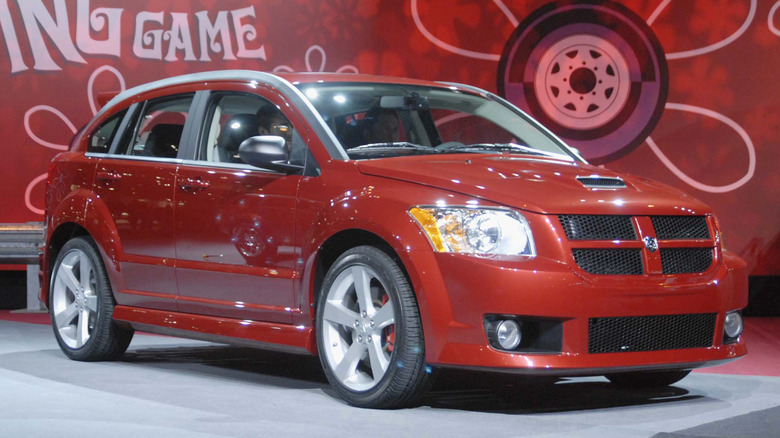The Common Problems With The Chrysler 2.4 TigerShark Engine
There's an interesting bit of history behind the Chrysler 2.4 Tigershark engine. Chrysler established the Global Engine Manufacturing Alliance (GEMA) with Hyundai and Mitsubishi in 2002, a partnership that resulted in three types of four-cylinder engines. One of these engines was the 2.4-liter mill that produces 172 horsepower in the Dodge Caliber R/T, and a turbocharged 285-horsepower variant in the Caliber SRT-4.
However, Chrysler acquired GEMA in 2009, but Italian auto giant Fiat bought Chrysler in 2013, forming what we know now as Fiat-Chrysler Automobiles (FCA). Chrysler was redesigning the 2.4 engine when Fiat entered the fray, and thus received a MultiAir2 variable valve timing head from Fiat, which is a similar design to Honda's proprietary VTEC technology. However, the rechristened 2.4 TigerShark only has variable valve timing and variable lift on the intake side.
The FCA 2.4 TigerShark is standard in many vehicles, including the Jeep Cherokee, Jeep Renegade, and the discontinued Dodge Dart. It's a reasonably decent engine with higher-than-average reliability and fuel economy scores, but the redesign during the Fiat-Chrysler merger has introduced a few lingering issues.
Common problems with the TigerShark engine
Adding Fiat's MultiAir2 variable valve timing technology to the 2.4 TigerShark has opened up a Pandora's box of oil and lubrication problems. The system has hiked the power output by managing the airflow through the pistons during the combustion cycle, enabling the 2.4 TigerShark to produce between 172-285 horsepower. Then again, the system's piston rings are prone to failure, allowing more oil to enter the combustion chambers.
The result is excessive oil consumption, poor performance, mediocre fuel economy, and higher emissions. Moreover, burning oil means a hotter engine since motor oil helps lower internal temperatures in addition to its lubricating properties. Exacerbating the problem is an often faulty oil pressure switch that refuses to remind the driver of low oil levels in the engine. When a gasoline motor is starving of oil, it causes significant wear on the pistons, cylinder walls, and other moving parts, causing it to fail.
The issues were so rampant that FCA agreed to an $8 million class action settlement regarding its faulty 2.4-liter TigerShark engine in 2022. FCA settled without acknowledging the engine's faults, but the agreement includes an extended warranty (7 years or 100,000 miles) covering all the parts and labor required to solve the problem.

